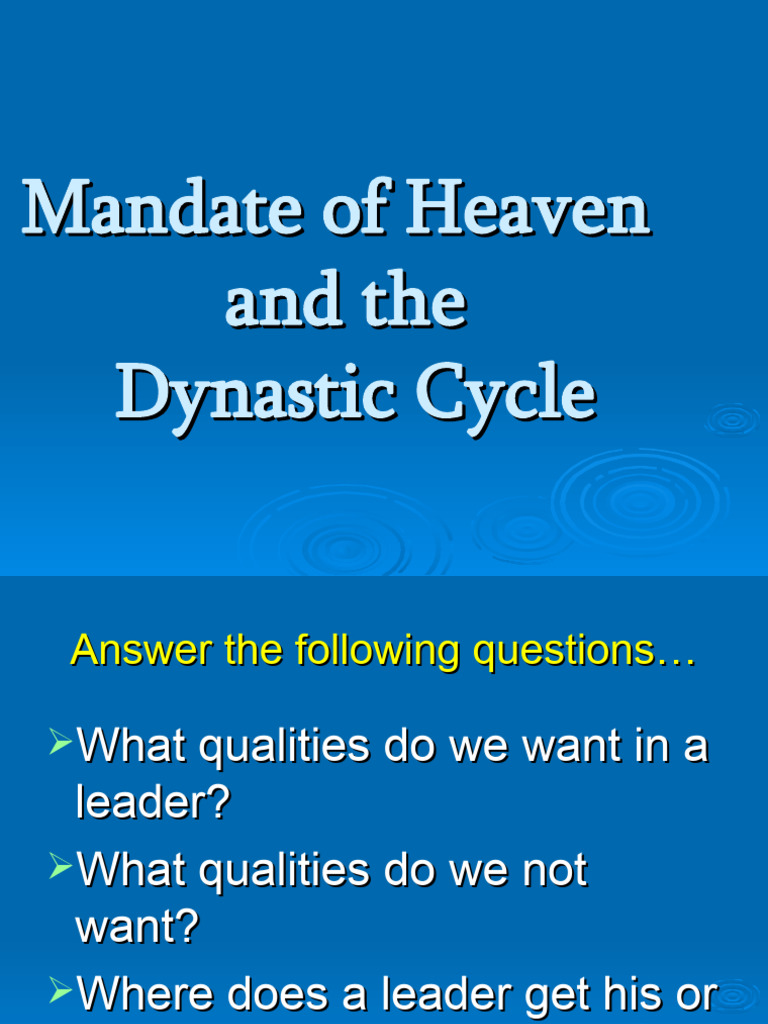Mandate of Heaven: Understanding China's Ancient Political Philosophy

The Mandate of Heaven is one of China’s most profound and enduring political philosophies, shaping its history, governance, and cultural identity for millennia. Rooted in ancient Chinese thought, this concept explains the divine justification for a ruler’s authority and the criteria for its legitimacy. Understanding the Mandate of Heaven offers valuable insights into China’s past and its influence on modern political ideologies. Whether you’re a history enthusiast, a student, or a professional exploring Chinese culture, this guide will illuminate this ancient philosophy’s significance.
What is the Mandate of Heaven?

The Mandate of Heaven (Tianming in Chinese) is the belief that heaven (Tian) bestows the right to rule upon just and capable leaders. This divine approval is not permanent; it can be revoked if a ruler becomes tyrannical, immoral, or ineffective. The philosophy emerged during the Zhou Dynasty (1046–256 BCE) as a way to justify their overthrow of the Shang Dynasty, claiming that heaven had withdrawn its mandate from the Shang rulers.
📌 Note: The Mandate of Heaven is not a religious doctrine but a political ideology used to legitimize rule and explain dynastic changes.
Key Principles of the Mandate of Heaven

The Mandate of Heaven rests on three core principles:
1. Divine Approval: Rulers are chosen by heaven to govern justly.
2. Moral Governance: Leaders must act with virtue and prioritize the welfare of their people.
3. Revocability: Misrule or natural disasters (seen as signs of heaven’s displeasure) can lead to the loss of the mandate.
These principles ensured that rulers remained accountable, as their authority was contingent on their ability to maintain harmony and prosperity.
Historical Impact of the Mandate of Heaven

The Mandate of Heaven played a pivotal role in Chinese history, influencing dynastic transitions and shaping political discourse. For example:
- The Zhou Dynasty used it to justify their rise to power.
- The Ming Dynasty invoked it to legitimize their overthrow of the Mongols.
- During times of crisis, such as famine or invasion, rulers were often accused of losing the mandate, fueling rebellions and regime changes.
| Dynasty | Rise to Power | Claim to Mandate |
|---|---|---|
| Zhou | Overthrew Shang Dynasty | Shang rulers were corrupt and immoral |
| Ming | Overthrew Yuan Dynasty | Mongol rule was unjust and foreign |

The Mandate of Heaven in Modern Context

While the Mandate of Heaven is an ancient concept, its influence persists in modern China. The Chinese Communist Party (CCP) has adapted its principles to justify its rule, emphasizing governance legitimacy through economic prosperity and social stability. Phrases like “serving the people” echo the mandate’s emphasis on moral leadership.
How to Apply the Mandate of Heaven Today

For those studying leadership or governance, the Mandate of Heaven offers timeless lessons:
- Prioritize Public Welfare: Leaders must act in the best interest of their people.
- Maintain Moral Integrity: Ethical behavior is essential for legitimacy.
- Stay Accountable: Recognize that authority is not absolute but earned through performance.
Related Keywords: Chinese political philosophy, Zhou Dynasty history, leadership principles, ancient Chinese governance.
What does the Mandate of Heaven mean?
+The Mandate of Heaven is the ancient Chinese belief that heaven grants the right to rule to just and capable leaders, which can be revoked for misrule.
How did the Mandate of Heaven justify dynastic changes?
+It was used to explain that overthrown rulers had lost heaven’s favor due to their failures, legitimizing the rise of new dynasties.
Is the Mandate of Heaven still relevant today?
+Yes, its principles of moral governance and accountability continue to influence modern leadership philosophies, including in contemporary China.
The Mandate of Heaven remains a cornerstone of Chinese political thought, offering a framework for understanding leadership, legitimacy, and governance. From ancient dynasties to modern regimes, its principles underscore the importance of moral integrity and public welfare in ruling. By studying this philosophy, we gain not only historical insight but also lessons applicable to leadership in any era. Whether you’re exploring China’s past or its present, the Mandate of Heaven provides a lens through which to view the nation’s enduring political ideals.



